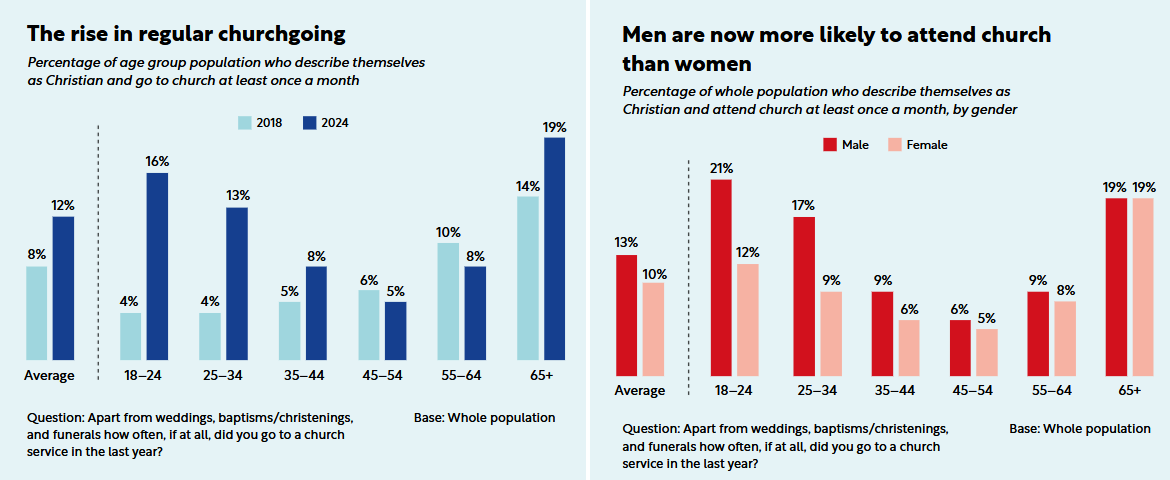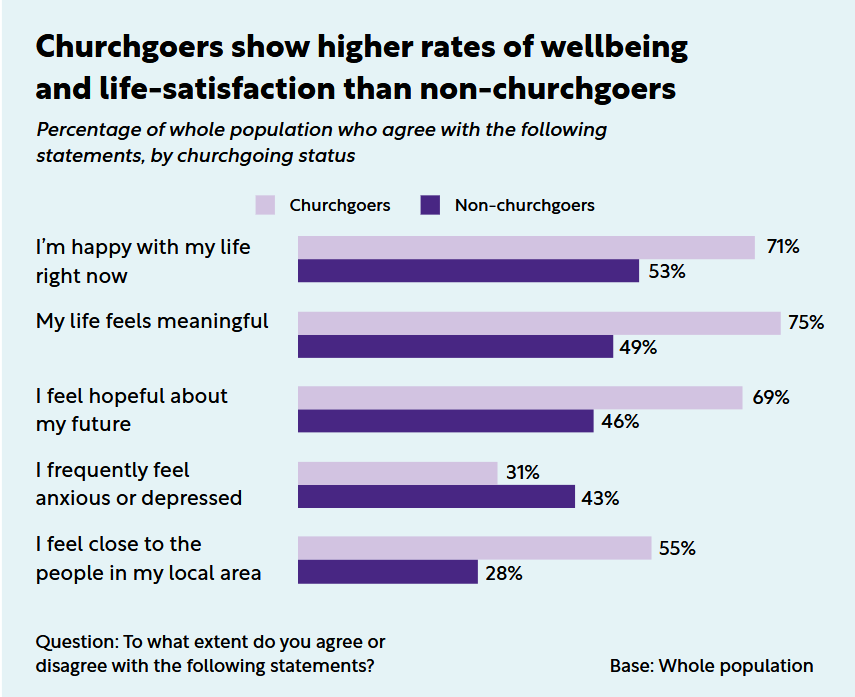England and Wales: 56% more go to church than 7 years ago
The increase in young men is fivefold, and 37% of all those under 24 say they are curious about the Bible. The YouGov study points to a steady decline in nominal Christianity but faith is becoming “even culturally attractive”.
LONDON · 10 APRIL 2025 · 13:04 CET
![A historic church in London, England. / Photo: <a target="_blank" href="[link]">Javier Martínez</a>, Unsplash, CC0.,](https://cms.evangelicalfocus.com/upload/imagenes/67f7a3168bcdf_javier-martinez-tfYY_eI9d04-unsplashCropped.jpg)
“The tide of faith is coming in again, and the Church needs to adjust to a new and strangely hopeful reality”. This is one of the main ideas of a new report in England and Wales that shows what could be an unexpected ‘quite revival’.
Between November and December 2024, the polling firm YouGov surveyed over 13,000 adults for the Bible Society.
The data shows that while in 2018, 8% of the population regularly attended church services, in 2024 it was 12%, going from 3.7 million to 5.8, a massive increase of 56% in just 7 years.
Men now much more likely to attend church
The growth is especially visible among men. 21% of men between the ages of 18 and 24 in England and Wales say they now attend church at least once a month, a figure five times higher than in 2018. Although lower, the growth is also spectacular among women in that age group (now 12%). Combined, the youngest age group in has gone from 4% seven years ago to 16% at present.

Data and graph: The Quiet Revival report, Bible Society UK reservados But the slightly older age group (25-34) has also seen a significant jump: from 4% to 13% (again, with a strong push from men, with 17% church attendance).
Only among 45- to 54-year-olds is there a decrease in church attendance (from 16% to 13%), while among those over 65 the figures go up again (from 14% to 19%).
With these data in hand, the report concludes that there is a “radical challenge to long-established predictions around the future of religion– and in particular Christianity – in twenty-first century Britain. Instead of a continuing decline we see explosive growth; instead of a Church populated predominantly by older women, we see a rising number of men and younger generations joining”.
Real diversity in churches
The make-up of the church has also changed. Currently, 32% of churchgoers are from an ethnic minority, compared to only 6% among those aged 65 or more. This means that the church is more ethnically diverse than society as a whole.
However, the exponential growth in interest in the Christian faith is not only due to the faith of thousands who have a minority background. The study reveals a significant increase in church attendance among white men, from 3% to 18% in the last seven years only.
With regard to the trends in Christian denominations, the report concludes the following: “Whereas in 2018 Anglicans made up 41% of churchgoers, this has dropped to 34% in 2024, with Roman Catholics now close behind them with 31% (up from 23%) and Pentecostals up from 4% to 10% of the Church”.
45% believe in some kind of God
While the ‘New atheism’ movement, very strong in the UK with authors such as Richard Dawkins or Christopher Hitchens, proclaimed the definitive death of religion in Great Britain, the data now shows a very different picture.
Young people between 18 and 24 who say they believe “in a God, gods or a ‘higher power’” have grown from 28% to 45%, the same in the 25-34 (31% to 40%) and 35-44 (37% to 39%) age groups. In other words, the youngest have overtaken all previous generations in their faith.
19% per cent of young people in the youngest age group say they read the Bible outside of church.
Further evidence that “Christianity no longer feels bizarre, nonsensical or embarrassing”, says the report, is that 18–24-year-olds are second only to over-65s in agreeing that they would be “happy to be seen reading a Bible in public” (at 32%, with 33% disagreeing).
Having a Christian faith, the researchers conclude, is again “being normalised” in England and Wales and is arguably “even culturally attractive”.
But while the practice of the Christian faith is growing strongly, there is also an opposite movement. In general terms, fewer and fewer people identify as ‘Christian’ in general terms, which points to a decline in so-called ‘nominal Christianity’, that is, people who identify as Christian but show no visible commitment to this faith.
Practising Christians have more wellbeing, better connected
The report also points to indicators about wellbeing and social connections.
“75% of churchgoers agree their life feels meaningful! compared to 49% of non-churchgoers”, the report found.

Data and graph: The Quiet Revival report, Bible Society UK reservados And “69% of churchgoers agree they feel hopeful about their future compared to 46% of non-churchgoers”.
Furthermoe, “55% of churchgoers agree they feel close to the people in their local area compared to 28% of non-churchgoers”.
The Bible
The study concludes that it is difficult for citizens in England and Wales to come across teachings from the Bible outside the context of the church. 79% never or almost never read it, 51% of those surveyed consider that it “is not relevant to my life”.
One in three respondents admit that their “trust in the Bible is shaken by the messages of the media and British culture”. However, 60% of respondents still believe that it is good for children to know some of the Bible’s stories.
But the Bible is seen differently among churchgoers. 80% of younger adults read it at least once a week (more often than older believers) and while 65% read the Bible in paper form, another 52% also do so using mobile apps.
‘The Church is in a period of rapid growth, driven by young adults’
The conclusions that the Bible Society draws from this large amount of objective data on the current situation in England and Wales are very positive.
“For decades, Church attendance and nominal adherence to Christianity has been declining, and it has been assumed that this decline would continue and was in some sense an inevitable product of modernity”, they say. “While the decline has certainly been real, we now know that the trend has been reversed”.
“A new generation is finding hope in the Christian message and in established Christian communities. This hope is both personal and social. It appears to meet a hunger for connection, belonging and purpose but it also helps frame meaningful engagement in the world to address some of the intractable problems that we all face – injustice, inequality, climate change – and to form an alternative to the individualistic, competitive, materialistic worldview that has come to dominate western societies in recent decades”.
The Bible Society, led by Paul S. Williams, adds: “We found that the Church is in a period of rapid growth, driven by young adults and in particular young men. Along with this, the Church demonstrates greater ethnic diversity than ever before. Both within and outside the Church, young adults are more spiritually engaged than any other living generation, with Bible reading and belief in God on the rise”.
Reactions
Gavin Calver, leader of the UK Evangelical Alliance reacted on social media to the study saying that the data confirms that “the Lord is moving powerfully throughout the UK”:
Incredible & hugely encouraging new research out from the @biblesociety today. The Lord is moving powerfully throughout the UK. The ‘Quiet Revival’ research includes some remarkable results as shown below & is available to download in full here https://t.co/7G4ltg91H3 pic.twitter.com/O4RbVAQVdo
— Gavin Calver (@GavCalver) April 8, 2025
Justin Brierly, who has researched the rise of Christian faith in the UK in recent years, also reacted to the data:
A 5-fold increase in young men going to church!?…
— Justin Brierley (@JusBrierley) April 8, 2025
Data released today by @biblesociety shows a phenomenal rise in young people, especially men, attending church in the UK.
I spoke to Dr Rhiannon McAleer about the #quietrevival pic.twitter.com/UOxzJWFcSB
Join us to make EF sustainable
Learn all about our #TogetherInThisMission initiative here (English).
Published in: Evangelical Focus - europe - England and Wales: 56% more go to church than 7 years ago
